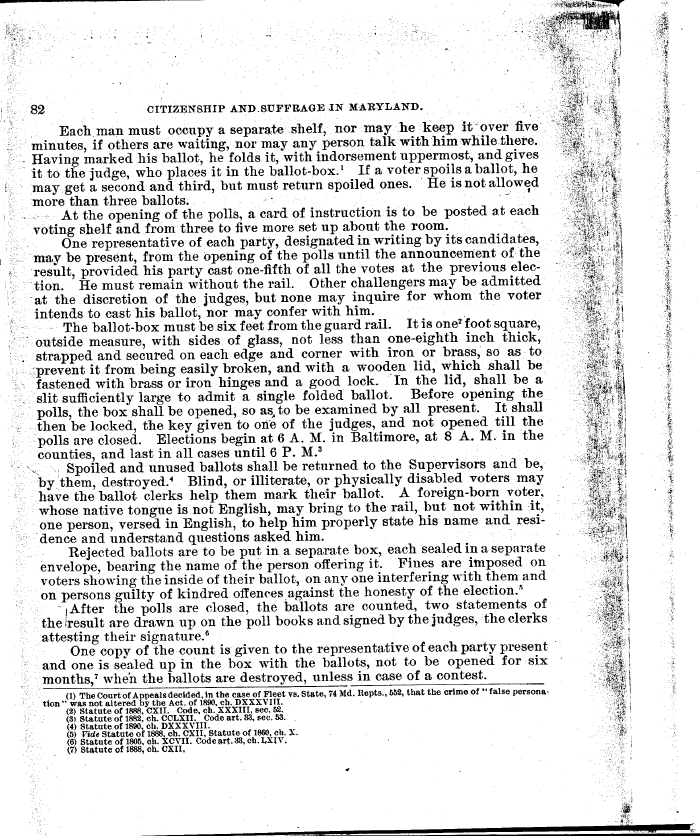|
82
CITIZENSHIP AND.SUFFRAGIE .IN MARYLAND.
Each man must occupy a separate .shelf, nor may he keep it ~ over five
minutes, if others are waiting, nor may any person talk with him while
there.
Having marked his ballot, he folds it, with indorsement uppermost, and gives
it to the judge, who places it in the ballot-box.' If a voter spoils a
ballot, he
may, get a second and third, but must return spoiled ones. He is not allowed
more than three ballots.
At the opening of the polls, a card of instruction is to be posted at each
voting shelf and from three to five more set up about the room.
One representative of each party, designated in writing by its candidates,
may be present, from the opening of the polls until the announcement of the
result, provided his party cast one-fifth of all the votes at the previous
elec-
tion. He must remain without the rail. Other challengers may be admitted
at the discretion of the judges, but none may inquire for whom the voter
intends to cast his ballot, nor may confer with him.
The ballot-box must be six feet from the guard rail. It is one2 foot square,
outside measure, with sides of glass, not less than one-eighth inch thick,
strapped and secured on each edge and corner with iron or brass; so as to
prevent it from being easily broken, and with a wooden lid, which shall be
fastened with brass or iron hinges and a good
slit sufficiently large to admit a single folded
lock. In the lid, shall be a
ballot.. Before opening the
polls, the box shall be opened, so as to be examined by all present. It
shall
then be locked, the key given to one of the judges, and not opened till the
polls are closed. Elections begin at 6 A. M. in Baltimore, at 8 A. M. in the
counties, and last in all cases until 6 P. M.3
Spoiled and unused ballots shall be returned to the Supervisors and be,
`by_,them, destroyed.' Blind, or illiterate, or physically disabled voters
may
have the ballot clerks help them mark their ballot. A foreign-born voter,
whose native tongue is not English, may bring to the rail, but not within
-it,
one person, versed in English, to help him properly state his name and,
resi-
dence and understand questions asked him.
Rejected ballots are to be put in a separate box, each sealed in a separate
envelope, bearing the name of the person offering it. Fines are imposed on
voters showing the inside of their ballot, on any one interfering with them
and
on persons guilty of kindred offences against the honesty of the election.'
After the polls are closed, the ballots are counted, two statements of
the (result are drawn up on the poll books and signed by the judges, the
clerks
attesting their signature.'
One copy of the count is given to the representative of each party present
and one is sealed up in the box with the ballots, not to be opened for six
months,' when the ballots are destroyed, unless in case of a contest.
(1) The Court of Appeals decided, in the case of Fleet vs. State, 74 Md.
Repts., 552, that the crime of " false persona-
tion' was not altered by the Act. of 1890, ch. DXXXVIII.
(2) Statute of 1888, CXII. Code, ch. XXXIII, sec. 52.
(3) Statute of 1882, ch. CCLXII. Code art. 33, sec. 53.
(4) Statute of 1890, ch. DXXXVIlI.
(5) fide Statute of 1888, ch. CXII Statute of 1860, ch. X.
(7j Statute o 1888, ch. C$IIII. Code art. 33, c6. LXIV.
|

